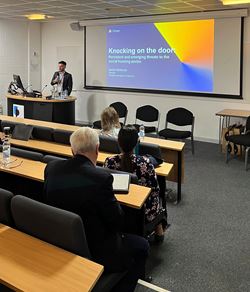
Crowe’s Insights from the 14th Counter Fraud, Cybercrime, and Forensic Accounting Conference

As proud headline partner, Crowe attended this year’s Counter Fraud, Cybercrime and Forensic Accounting Conference, held on 18-19 June 2025 at the University of Portsmouth.
This annual event brings together academics and professionals from around the world to share research and perspectives on economic crime, cybercrime and forensic accounting.
Sharing Crowe’s insights
As part of our sponsorship, Crowe delivered two presentations exploring key trends in fraud and cybercrime, drawing on our own expertise and research.
During the keynote on day one, Daniel Sibthorpe, Director of Forensic Services, provided an overview of the current threat landscape. Cyber crime and fraud now account for up to 50% of all UK crime, with a continued rise in scale and complexity. The recent incident at Marks and Spencer — reportedly costing the company £300 million — highlights the growing financial and reputational risks organisations face. Not to mention, total UK fraud losses are estimated to be as high as £219 billion.
Despite these challenges, the 2025 UK Cyber Security Breaches Survey revealed a decline in the number of organisations with a board member responsible for cyber security governance, which raises concerns about how cyber security is being managed at the very top of organisations.
The presentation also explored new and emerging threats, including QR code phishing, as well as the increasing accessibility of cyber crime tools through cybercrime-as-a-service (CaaS) platforms. With Artificial Intelligence (AI) also playing a significant role, Daniel emphasised the need for organisations to remain proactive in their resilience against evolving cybercrime and fraud tactics.
On day two, our focus turned to the social housing sector. In a session titled “Knocking on the door: Persistent and emerging threats to the social housing sector”, Daniel outlined the growing fraud and cyber risks facing housing providers. Unlike some other sectors, most fraud in this sector is committed by tenants rather than employees. Tenancy fraud includes submitting false information on applications, unauthorised subletting, non-occupation, abandonment, and falsely claimed succession rights. Alarmingly, tenancy fraud rose by 140% in 2022/23, and one in four providers experienced a cyberattack in the same period.
To better understand these risks, Crowe partnered with KYND to research the cyber risks facing UK social housing providers. Daniel shared the key findings from this study, revealing that over half of the providers surveyed had risks related to email configuration, digital certificates, known vulnerabilities, and outdated software. With both tenancy fraud and cyber crime presenting a threat to the sector, the session emphasised the need for robust identity verification tools and investment in cyber security measures — particularly due to AI and CaaS platforms.
Highlights from across the industry
The two-day event featured a wide range of speakers offering diverse perspectives on tackling fraud and cybercrime.
Fran Dowling, Head of the UK Home Office’s Fraud Policy Unit, gave early insight into the upcoming new UK fraud strategy expected later this year. With aims to protect the public, safeguard growth, and deliver justice, the strategy presents a strong opportunity to further strengthen national fraud resilience.
Dr Diana Johnson, Solicitor and Senior Lecturer in Law at the University of the West of England, offered a legal perspective on the forthcoming Failure to Prevent Fraud offence coming into force in September 2025. While its scope applies to large organisations, she highlights that only 0.1% of UK companies meet that criterion. Furthermore, the offence introduces a shift in corporate accountability. It lowers the threshold for organisational criminal liability by expanding it beyond director-level individuals to include senior managers to address the challenge in prosecuting corporate fraud.
Complementing Daniel’s presentation on social housing, Dr Janice Goldstraw-White, Perpetuity Research, explored the risks linked to the private rented sector. With limited oversight, minimal vetting, and a large number of private landlords, the sector is increasingly suspectable to crime, from money laundering and tax evasion to modern slavery and organised drug crime. Her session reinforced that housing—whether social or private—remains a prime target for fraud and exploitation.
Looking ahead
From academic research to practical insight, the two-day conference was a valuable opportunity for our Forensic Services team at Crowe to stay at the forefront of evolving economic and cyber threats and ensure our clients have the knowledge and support they need to remain resilient.
If you would like some further advice or support, our Forensic Services team is always available for a conversation to help ensure your organisation is effectively managing fraud and cyber risks, and is prepared to respond in the event of an incident.
Contact us

Insights




